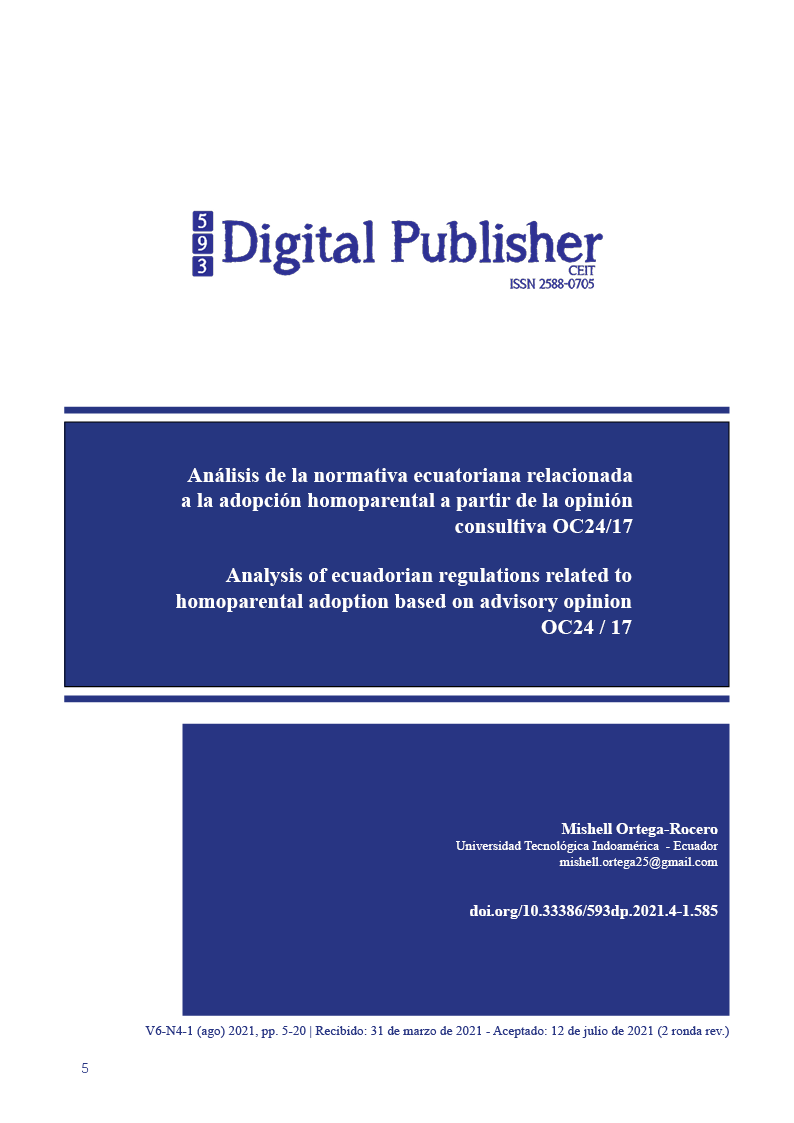Analysis of ecuadorian regulations related to homoparental adoption based on advisory opinion OC24 / 17
Main Article Content
Abstract
This work analyzes the existing viability in the country regarding homoparental adoption, taking into consideration what was mentioned by the Inter-American Court of Human Rights in its advisory opinion OC24 / 17. For this purpose, the principle of non-discrimination was analyzed within the internal and international regulations that are in force within the Ecuadorian territory. The principle of non-discrimination established in the Constitution of the Republic, mentions that all people are equal and therefore will enjoy the same duties, obligations, rights and that they will not suffer any type of discrimination, a situation that allows people to enjoy of their right to the free development of their personality, being able to form a homoparental family. The family is legally protected by the internal and external legal framework, this has a broad definition, which not only protects a traditional or specific model of it, but on the contrary, the family is recognized in its various types, preventing discrimination same-sex couples, since human rights treaties are of evolutionary interpretation. The advisory opinion under study in this essay recognizes the right to equality and non-discrimination, in such a way that it protects the family bond and guarantees the right to marriage between people of the same sex and, therefore, to adoption. This opinion is binding on our country, thus allowing adoption between same-sex couples, since discrimination by law is prohibited. The measure also does not present a risk regarding the upbringing of children either, since there is ample scientific evidence that they perform just as well as those raised by parents of different sexes.
Downloads
Article Details

This work is licensed under a Creative Commons Attribution-NonCommercial-ShareAlike 4.0 International License.
1. Derechos de autor
Las obras que se publican en 593 Digital Publisher CEIT están sujetas a los siguientes términos:
1.1. 593 Digital Publisher CEIT, conserva los derechos patrimoniales (copyright) de las obras publicadas, favorece y permite la reutilización de las mismas bajo la licencia Licencia Creative Commons 4.0 de Reconocimiento-NoComercial-CompartirIgual 4.0, por lo cual se pueden copiar, usar, difundir, transmitir y exponer públicamente, siempre que:
1.1.a. Se cite la autoría y fuente original de su publicación (revista, editorial, URL).
1.1.b. No se usen para fines comerciales u onerosos.
1.1.c. Se mencione la existencia y especificaciones de esta licencia de uso.
References
Alcaraz, S. (2007). La incondicionalidad de los derechos humanos en los tiempos actuales. Revista del Posgrado en Derecho de la UNAM, 171-186. Obtenido de https://www.google.com/url?sa=t&rct=j&q=&esrc=s&source=web&cd=&ved=2ahUKEwjb3JXGnanvAhVSo1kKHfKNDVwQFjACegQIARAD&url=https%3A%2F%2Frevistas-colaboracion.juridicas.unam.mx%2Findex.php%2Frev-posgrado-derecho%2Farticle%2Fdownload%2F17160%2F15369&usg=AOvVaw3S
Alexy, R. (2014). Teoría de los derechos fundamentales. Madrid: CEPC. Obtenido de http://arquimedes.adv.br/livros100/Teoria%20de%20los%20Derechos%20Fundamentales-Robert%20Alexy.pdf
Benavides, G. (2019). El derecho a la igualdad y no discriminación de las personas en movilidad humana. Obtenido de Defensoría del Pueblo de Ecuador : http://repositorio.dpe.gob.ec/bitstream/39000/2345/1/AD-DPE-006-2019.pdf
Chaparro, L., & Guzmán, Y. (2016). Adopción homoparental: Estudio de derecho comparado a partir de las prespectivas de los países latinoamericamos que la han aprovado. Revista CES Derecho, 1-3. Obtenido de https://repository.eafit.edu.co/handle/10784/12389
Constitución de la República del Ecuador. (2008). Constitución de la República del Ecuador. Quito, Ecuador.
Convención Americana sobre Derechos Humanos “Pacto de San José de Costa Rica”. (22 de Noviembre de 1969). Organización de los estados Americanos. Obtenido de Organización de los estados Americanos: https://www.oas.org/dil/esp/tratados_b-32_convencion_americana_sobre_derechos_humanos.htm
Corte Interamericana de Derechos Humanos. (Octubre de 1979). Estatuto de la Corte Interamericana de Derechos Humanos. Obtenido de https://www.oas.org/36ag/espanol/doc_referencia/Estatuto_CorteIDH.pdf
Corte Interamericana de Derechos Humanos. (14 de Noviembre de 1997). Opinión Consultiva oc-15/97. Informes de la Comisión Interamericana de Derechos Humanos. Obtenido de https://www.corteidh.or.cr/docs/opiniones/seriea_15_esp.pdf
Corte Interamericana de Derechos Humanos. (24 de Noviembre de 2017). Opinión Consultiva OC-24/17. Identidad de género, e igualdad y no discriminación a parejas del mismo sexo. Obtenido de https://www.corteidh.or.cr/docs/opiniones/seriea_24_esp.pdf
Dávila, V. (2018). Principio de igualdad y no discriminación por orientación sexual, en el acceso al matrimonio civil en la Constitución 2008. Obtenido de Repositorio Universidad Central del Ecuador: http://www.dspace.uce.edu.ec/bitstream/25000/16969/1/T-UCE-0013-JUR-108.pdf
Estefan, S. (2013). Discriminación estatal de la población LGBT. Casos de transgresiones a los derechos humanos en Latino América. Revista Sociedad y Economía, 183-204. Obtenido de https://www.redalyc.org/pdf/996/99629494008.pdf
Galiano, G., & Tamayo, G. (2018). Análisis constitucional de los derechos personalísimos y su relación con los derechos del buen vivir en la Constitución de Ecuador. Revista de Derecho Privado. Obtenido de https://www.redalyc.org/jatsRepo/4175/417555894005/html/index.html
García, J. (22 de Agosto de 2012). Análisis jurídico de los derechos del Art. 11 de la Constitución. Obtenido de DerechoEcuador.com: https://www.derechoecuador.com/analisis-juridico-de-los-derechos-del-art-11-de-la-constitucion
Hernandez, R., Fernández, C., & Baptista, M. (2014). Metodología de la investigación. México: McGraw-Hill.
León, M. A. (2019). La fuerza vinculante de la OC-24/17 “Identidad de género, e igualdad y no discriminación a parejas del mismo sexo” para el estado ecuatoriano. FORO: Revista de Derecho, 43-60. Obtenido de https://www.google.com/url?sa=t&rct=j&q=&esrc=s&source=web&cd=&ved=2ahUKEwjYicXI16HvAhVloFkKHSiBAUYQFjACegQIFBAD&url=https%3A%2F%2Frevistas.uasb.edu.ec%2Findex.php%2Fforo%2Farticle%2Fdownload%2F1258%2F1159%2F&usg=AOvVaw1H5OCHQbeAdQRUlAt0hwkp
Martínez, J., Sáenz, M., & Echeverry, J. (2019). Efectos de adopción y crianza homoparental. Arch Med, 19(2), 396-06. doi:https://doi.org/10.30554/archmed.19.2.3321.2019
Organización de las Naciones Unidas. (26 de Junio de 1945). Carta de las Naciones Unidas. Obtenido de Naciones Unidas: https://www.un.org/es/charter-united-nations/
Paredes, G., & Núnez, M. (2019). El matrimonio igualitario a la luz de la Convención Americana: análisis de la Opinión Consultiva OC-24/17 en el contexto jurídico ecuatoriano. FORO: Revista de Derecho, 61-81. Obtenido de https://revistas.uasb.edu.ec/index.php/foro/article/view/1260/1170
Zuleta, A. (2019). El principio de igualdad y no discriminación analizado desde la figura de la mujer como sujeto de derechos. RES NON VERBA, 1-14. Obtenido de http://revistas.ecotec.edu.ec/index.php/rnv/article/view/216/175


